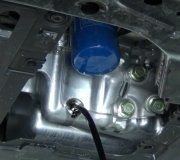I have a 3.0L Saturn Vie AWD V6
Now I was on a trip a few hours away from home, my alternator went and I had to get a shop to install a new alternator they did it, but after they were done I noticed the belt squeaked they said it was oil and it would wear off.
So I went to drive home, I noticed after about a hour of driving the temperature heated up quickly to the max, so I pulled over and checked the engine everything looked fine let it cool down, then took off it did it again and then I lost my temperature gauge it was running fine I drove it like this for 30 minutes, and then noticed my battery light came on and pulled over and shut it down as my battery was toast.
I heard a gurgling sound and the next morning all the antifreeze was gone from the reservoir.
I got towed home I guess what happened was they never cleaned the pulleys off and there was undercoating causing the belt to slip,
now I cleaned the pulleys off and put a new belt on and refulled the antifreeze I can't see any leak, but I noticed on startup if it sets over night theres a small amount of white smoke for a few seconds and then it disappears im assumong this is a head gasket?
it doesnt appears theres antifreeze mixing with the loild and it must be a minimal leak.
So is this a head gasket and is it safe to drive it like this for a bit?
thanks
Wednesday, December 25th, 2013 AT 10:24 AM


